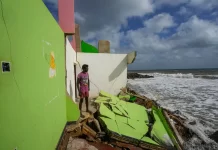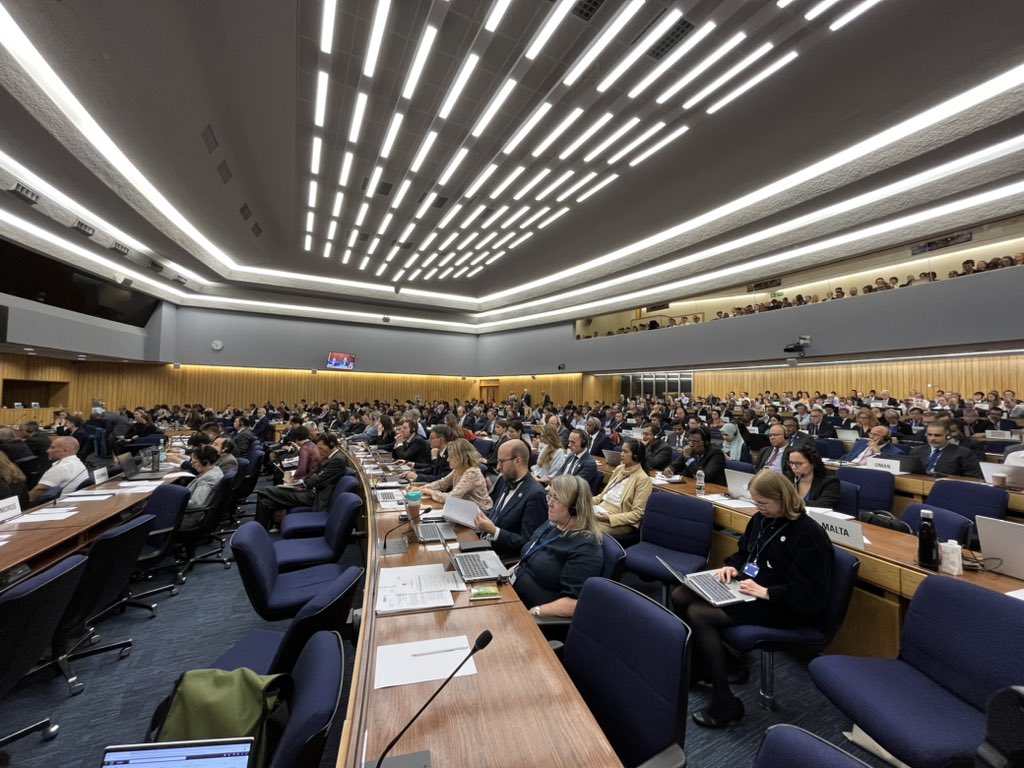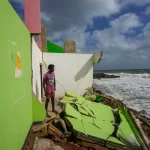A campaign by climate-vulnerable Pacific islands to raise governments’ ambition on emissions-cutting for the global shipping industry looks set to fail at talks in London.
With just over a day of negotiations left at the International Maritime Organisation’s (IMO), the latest draft strategy does not significantly improve on targets that were branded “not ambitious enough” and “devastating” when they were first proposed on Monday.
Vanuatu’s climate minister Ralph Regenvanu told Climate Home at the time that he and counterparts from other Pacific island nations were “going to fight” to improve targets to reduce emissions on 2008 levels by 20 percent by 2030 and 70 percent by 2040.
“That’s what we’re here for, we’re here to lobby”, he said, hours after the talks’ chair drew up the roadmap after listening to governments debate the strategy behind-closed-doors the week before.
But a new draft strategy was released this morning which did not substantially improve on those goals. The only increase in ambition was that additional targets to “striv[e]” for 25 percent by 2030 and 75 percent by 2040 were made a more definite part of the draft strategy.
The document has yet to be made public so negotiators and campaigners have not commented. But the 2030 and 2040 targets were slammed on Monday with Australia’s negotiator labelling them “not ambitious enough”.
Shipping contributes to around three percent of global greenhouse gas emissions.
The Marshall Islands negotiator Albon Ishoda told journalists that “the science already told us” that “anything less than 36 percent by 2030 and 96% by 2040 will be detrimental” to limiting global warming to 1.5C and that will “have a devastating impact”.
The targets Ishoda called for have also been supported by the USA and UK and stem from what the Science-Based Targets Initiative judged compatible with limiting global warming to 1.5C.
The European Union called for slightly less ambitious figures of 29 percent and 83 percent while sources involved in last week’s closed talks, said some countries like China, South Africa and Saudi Arabia didn’t want 2030 or 2040 targets at all.
China’s negotiator argued in open talks on Monday that the targets should be “practical, reasonable and feasible” and their impact should be assessed. He described trade and development, as well as climate, as “existential” issues.
A debate over whether to target net zero “by” or “by or around” 2050 is set to be resolved with a compromise leaning more towards the weaker option. The new draft proposes targeting net zero “by or around, ie close to 2050, taking into account different national circumstances”.
In their speeches to the International Maritime Organisation (IMO) talks this week, the “2050 at the latest” goal was supported mainly by Pacific islands and developed countries.
The UK’s negotiator said 2050 should be “the absolute latest” and that the targets should be “in terms that can not be misunderstood”.
On the other hand, several big developing countries like China, Indonesia and Saudi Arabia called for the weaker “around 2050” target and the inclusion of language about “different national circumstances”.
The draft deal contains a target to get “zero or near-zero” fuel sources to represent at least 5% of the energy used by international shipping by 2030, while pledging to “striv[e]” for 10 percent.
Shipping is currently powered almost completely by fossil fuels. According to the International Energy Agency (IEA), “low-carbon fuels” represent near to 0 percent of shipping fuel.
A controversial proposal to put a tax on ships’ emissions is included in the draft document, although that would just mean it is considered in the coming years.
Although the document is understood to have been agreed by major economies like the U.S, EU and China, it is not a done deal yet.
Any country can call for a vote on any aspect of the agreement and change it with the support of more than half of the nations.
In the IMO, governments are often unwilling to do this. But Vanuatu’s Regenvanu said on Monday that he and others would think about calling a vote if a “minority group of countries” were going to stop a “high ambition outcome” against the will of an “overwhelming majority, and I mean like two-thirds”.
The document will be debated in talks, which are closed to the media, on Thursday afternoon. It will then be discussed publicly by governments on Friday when talks are set to end.
SOURCE: CLIMATE HOME/PACNEWS














